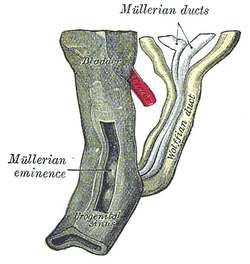Sinus tubercle
Appearance
(Redirected from Sinus tubercles)
| Sinus tubercle | |
|---|---|
 Urogenital sinus of female human embryo of eight and a half to nine weeks old. | |
| Anatomical terminology |
Sinus tubercle (also known as sinual tubercle[1] or Müllerian eminence) is the proliferation of endoderm induced by the paramesonephric ducts. It is located in the developing fetus between the orifices of the mesonephric ducts on the urogenital sinus.[1] The uterovaginal primoridium, which is a fusion of the caudal ends of paramesonephric ducts, contacts the dorsal wall of the urogenital sinus and, induces the formation of the sinus tubercle. This occurs in both sexes:
- In the female, the mesonephric duct loses all association with the gonad and disappears. The sinus tubercle then gives rise to the sino-vaginal bulbs and, when it later becomes solid it is referred to as the vaginal plate.[1] It likewise gives rise to the hymen, which eventually breaks down in most cases.
- In the males, the sinus tubercle gives rise to the seminal colliculus.
References
[edit] This article incorporates text in the public domain from page 1207 of the 20th edition of Gray's Anatomy (1918)
This article incorporates text in the public domain from page 1207 of the 20th edition of Gray's Anatomy (1918)- Moore Persaud, Medical embryology 2003
- ^ a b c Ruchelli, Eduardo D.; Ruchelli, Eduardo D.; Huff, Dale S.; Huff, Dale S. (2011), Ernst, Linda M.; Ruchelli, Eduardo D.; Huff, Dale S. (eds.), "Vagina", Color Atlas of Fetal and Neonatal Histology, New York, NY: Springer, pp. 195–198, doi:10.1007/978-1-4614-0019-6_17, ISBN 978-1-4614-0019-6, retrieved 2021-05-27
